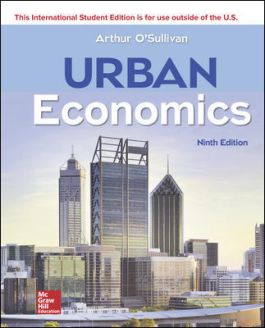Urban Economics ISE
9th Edition
1260288811
·
9781260288810
© 2019 | Published: October 2, 2018
Over the course of two decades, Urban Economics has achieved a worldwide audience, and has been translated into Chinese, Greek, Russian, and Korean. Like the eight previous editions, this edition provides a clear and concise presentation of the econ…
Read More
After you purchase your eBook, you will need to download VitalSource Bookshelf, a free app. Then login or create an account and enter the code from your order confirmation email to access your eBook.
- Note: the eBook does not include access to Connect
- Access the eBook anytime, anywhere: online or offline
- Create notes, flashcards and make annotations while you study
- Full searchable content: quickly find the answers you are looking for
PrefaceAcknowledgements
Part I: Introduction and Key Concepts
1. Introduction
2. Key Concepts of Urban Economics
Part II: Market Forces in the Development of Cities
3. Trading and Factory Towns
4. Agglomeration Economies
5. Where Do Cities Develop?
6. Consumer Cities and Central Place Theory
7. Cities in a Regional Economy
8. The Urban Labor Market
9. The First Cities
Part III: Urban Land Use and Housing
10. Land Rent and Manufacturing Land Use
11. Office Space and Tall Buildings
12. Housing Prices and Residential Land Use
13. Distribution of Jobs and People
14. The Monocentric City and Urban General Equilibrium
15. Neighborhoods
16. Land Policy
17. Urban Housing
Part IV: Urban Transportation
18. Cars and Roads
19. Public Transit
Part V: Local Government, Education, and Crime
20. Role of Local Government
21. Local Government Revenue
22. Education
23. Crime
24. Models of Microeconomics
Part I: Introduction and Key Concepts
1. Introduction
2. Key Concepts of Urban Economics
Part II: Market Forces in the Development of Cities
3. Trading and Factory Towns
4. Agglomeration Economies
5. Where Do Cities Develop?
6. Consumer Cities and Central Place Theory
7. Cities in a Regional Economy
8. The Urban Labor Market
9. The First Cities
Part III: Urban Land Use and Housing
10. Land Rent and Manufacturing Land Use
11. Office Space and Tall Buildings
12. Housing Prices and Residential Land Use
13. Distribution of Jobs and People
14. The Monocentric City and Urban General Equilibrium
15. Neighborhoods
16. Land Policy
17. Urban Housing
Part IV: Urban Transportation
18. Cars and Roads
19. Public Transit
Part V: Local Government, Education, and Crime
20. Role of Local Government
21. Local Government Revenue
22. Education
23. Crime
24. Models of Microeconomics
Over the course of two decades, Urban Economics has achieved a worldwide audience, and has been translated into Chinese, Greek, Russian, and Korean. Like the eight previous editions, this edition provides a clear and concise presentation of the economic forces that:
- cause the development of cities;- determine the spatial form of cities;- cause urban economies to grow or shrink;- generate urban problems such as poverty, crime, and congestion;- make the market for urban housing unique; and- shape the tax and spending policies of local governments.
In addition to developing the basic concepts of urban economics, the book uses economic analysis to evaluate the merits of policies designed to address our most vexing urban problems.
- cause the development of cities;- determine the spatial form of cities;- cause urban economies to grow or shrink;- generate urban problems such as poverty, crime, and congestion;- make the market for urban housing unique; and- shape the tax and spending policies of local governments.
In addition to developing the basic concepts of urban economics, the book uses economic analysis to evaluate the merits of policies designed to address our most vexing urban problems.

